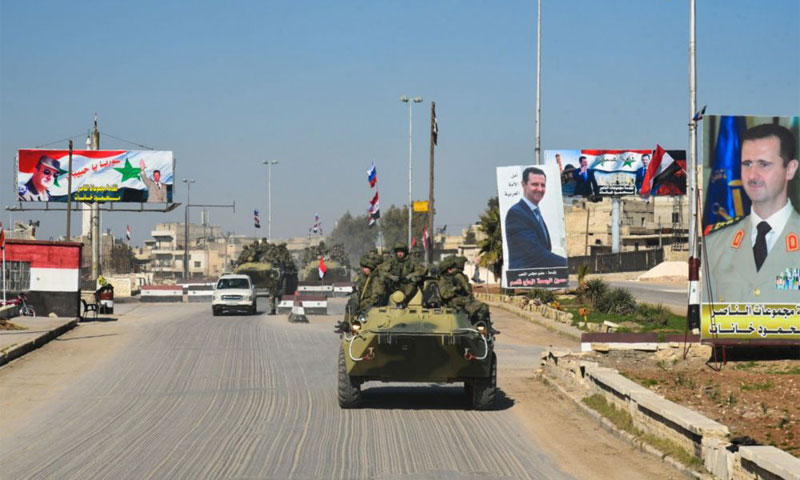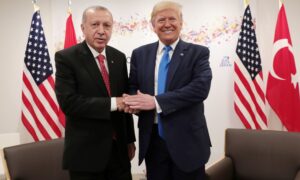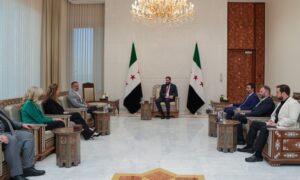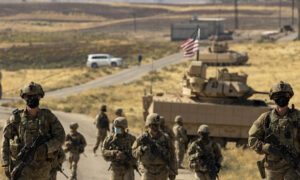
Killing in the Streets of Aleppo: Residents Living in Fear of Security Breakdown

“I’m scared when we hear news from my relatives about the security violations happening in Aleppo. I wanted to go back to my city after it was said to be safe, but I’m afraid of this and I want a solution sorted as soon as possible,” said Ammar, an Aleppo resident who currently lives outside Syria, responding to what is happening in the city today.
Despite the end of the battle of Aleppo, the phenomenon of “shabeehafication” (pro-Assad militiafication) and security breakdown has caused the city’s residents to live in a state of fear.
Assad forces recaptured the eastern districts of the city at the end of last year after continuous battles and bombardment against the opposition areas, but the pace of fighting has reduced and instead incidents of killing, “tafeesh” and repeated attacks returned to the forefront, affecting the districts under Syrian regime control amid dissatisfaction in the Assad loyalist streets.
The regime requested assistance from Russian air cover and the so-called Popular Committees, National Defense and Lebanese and Iraqi sectarian militias backed by Tehran to expel the rebels from the eastern areas of the city after the opposition maintained control over them from 2013.
Enab Baladi contacted a number of Aleppo residents in and outside the city to understand the reports about the security breakdown which the country is suffering from.
The event most often echoed and condemned among the people was the killing of the boy Ahmad, who was 13 years old, on June 11, near the Al-Ittihad football club by a Popular Committees members, who fled and was later arrested on June 15, according to loyalist newspapers.
The boy was trying to sell chewing gum and biscuits to a car of people in military clothes. One of the passengers shot him in the head from inside the car, which then fled immediately.
The city’s governor, Hussein Diyab, commented on the event at the time, saying that the relevant authorities would resolve the issue and arrest the “criminal,” pointing out that it “would not pass unnoticed,” after outrage from residents.
The boy’s father came out in a video recording with the journalist Kenana Alloush saying: “What happened, happened … but for what sin do you shoot a small child? Where are we living? …. We are in a city, not in the jungle,” and called for the killer to be held to account.
At the time the hashtag #Aleppoisbeingslaughteredsilently spread on social media to highlight the violations carried out by shabeeha (loyalist militias) in light of the absence of oversight.
A football team’s bus was also attacked, which led to four players being wounded before a match they were supposed to play on June 9 but which was delayed until further notice, after unknown gunmen opened fire on the vehicle, and then fled.
Shadi al-Halwa, a Syrian TV correspondent in Aleppo, said that the perpetrator or perpetrators were in the hands of the “relevant authorities,” as he put it, but the issue was not confirmed amid doubts among regime loyalist pages over the news.
Meanwhile, dentist Talar Vosekian was killed when she was hit by a car without a license plate, which was said to belong to the National Defense Forces militia.
Abou Mohamad, a resident still living in the city, said there were “cases of kidnapping and rapes of women in various parts of the city which have upset residents of the area and made them live in a state of fear. They have begun to complain about the spread of the phenomenon.” This is an issue which loyalist pages have covered and activists have spread on Facebook, but it was not possible for Enab Baladi to verify the accuracy of these reports in light of the absence of statistics or official documentation.
In a similar case, also on local and regime loyalist pages, there were reports about an incident that a girls’ dormitory in the university city was stormed by a group of young men said to live among “Palestinian” displaced people. The report blamed the lack of guards or security members appointed to protect the residents.
The group tried to storm the rooms and harass the female students “but they defended themselves using hot water.” However, the incident was not documented in official media, as the government agencies avoided commenting on it.
Abou Mohamad also pointed to the recent deployment of military police and moves by the governorate to control matters to prevent the Committees’ violations, which have become an obsession among Aleppines.
Enab Baladi met with Abou Abdu, an Aleppo resident who fled to Turkey after the situation deteriorated in the city, but who returned to the country after the regime recaptured the city, hoping that there would be better work opportunities there.
While Abou Abdu praised the security situation in Aleppo and said that people are “living in relative comfort compared with the previous circumstances,” he said that “the regime is fully in control of the situation and everything is as it should be,” saying coincidentally that his workshop was looted in Old Aleppo near the citadel in an area that had been under opposition control.
The carpenter said that the workshop was looted while the regime retook control of the city and not during the two years he spent outside Syria. When asked who was responsible for the theft, he said the situation was “incidental” and he did not know who did it.
Abou Abdu still avoids opening his workshop out of fear it will be broken into and looted again, and so he has begun to work with two other carpenters in another area, until the situation is completely resolved.
In similar cases, Enab Baladi spoke with business owners, some of whom avoided speaking about the security situation, pointing to the presence of security and stability and their ability to continue their daily lives.
Their hesitancy to speak about the security situation and the general violations may be related to the state of mental fear the regime has imposed on citizens over the years.
This article was translated and edited by The Syrian Observer. Responsibility for the information and views set out in this article lies entirely with the author.
if you think the article contain wrong information or you have additional details Send Correction
النسخة العربية من المقال
-
Follow us :

















 A
A
A
A
A
A








 More Politics
More Politics